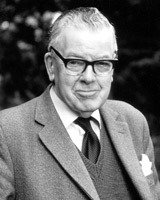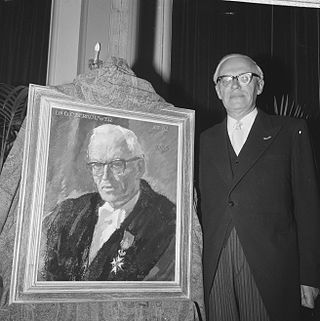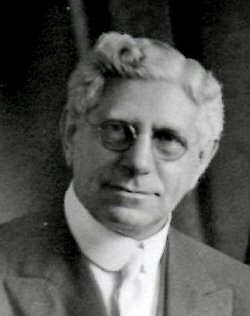
Karl Barth was a Swiss Reformed theologian. Barth is best known for his commentary The Epistle to the Romans, his involvement in the Confessing Church, including his authorship of the Barmen Declaration, and especially his unfinished multi-volume theological summa the Church Dogmatics. Barth's influence expanded well beyond the academic realm to mainstream culture, leading him to be featured on the cover of Time on 20 April 1962.

In Christianity, Jesus is believed to be the Son of God or God in human form as written in the Bible's New Testament, and in most Christian denominations he is held to be God the Son, a prosopon (person) of the Trinity of God.

Frederick Fyvie Bruce, usually cited as F. F.Bruce, was Rylands Professor of Biblical Criticism and Exegesis at the University of Manchester from 1959 until 1978 and one of the most influential evangelical scholars of the second half of the twentieth century. His importance comes from the fact that when the academic community looked down upon Evangelicals, Bruce demonstrated that a scholar holding evangelical views could do worthwhile academic work. At the same time, he persuaded Evangelicals that they should not turn their backs on academic methods of Bible study, even if the results might differ from traditional evangelical views. As a result, he has been called the "Dean of Evangelical Scholarship".

Gerrit Cornelis "G.C." Berkouwer was for years the leading theologian of the Reformed Churches in the Netherlands (GKN). He occupied the chair in systematic theology of the Faculty of Theology, Free University (VU) in Amsterdam.
James Douglas Grant Dunn, also known as Jimmy Dunn, was a British New Testament scholar, who was for many years the Lightfoot Professor of Divinity in the Department of Theology at the University of Durham. He is best known for his work on the New Perspective on Paul, which is also the title of a book he published in 2007.
This is a sub-page for the Justification (theology) page.

The attributes of God are specific characteristics of God discussed in Christian theology.
Neo-Calvinism, a form of Dutch Calvinism, is a theological movement initiated by the theologian and former Dutch prime minister Abraham Kuyper. James Bratt has identified a number of different types of Dutch Calvinism: The Seceders, split into the Reformed Church "West" and the Confessionalists; the neo-Calvinists; and the Positives and the Antithetical Calvinists. The Seceders were largely infralapsarian and the neo-Calvinists usually supralapsarian.

Louis Berkhof was a Dutch-American Reformed theologian whose works on systematic theology have been influential in seminaries and Bible colleges in the United States, Canada, Korea and with individual Christians in general throughout the 20th century.
Kevin Jon Vanhoozer is an American theologian and current research professor of Systematic Theology at Trinity Evangelical Divinity School (TEDS) in Deerfield, Illinois. Much of Vanhoozer's work focuses on systematic theology, hermeneutics, and postmodernism.
Reinhard Hütter is a Christian theologian and Professor of Fundamental and Dogmatic Theology at The Catholic University of America. During the 2012–2013 academic year, he held The Rev. Robert J. Randall Professor in Christian Culture chair at Providence College.
Bruce K. Waltke is an American Reformed evangelical professor of Old Testament and Hebrew. He has held professorships in the Old Testament at Dallas Theological Seminary, Regent College in Vancouver, British Columbia, Westminster Theological Seminary in Philadelphia, Pennsylvania, Reformed Theological Seminary in Orlando, Florida, and Knox Theological Seminary in Ft. Lauderdale, Florida.
Carl Edward Braaten was an American Lutheran theologian and minister.
Peter Eric Enns is an American Biblical scholar and theologian. He has written widely on hermeneutics, Christianity and science, historicity of the Bible, and Old Testament interpretation. Outside of his academic work Enns is a contributor to HuffPost and Patheos. He has also worked with Francis Collins' The BioLogos Foundation. His book Inspiration and Incarnation challenged conservative/mainstream Evangelical methods of biblical interpretation. His book The Evolution of Adam questions the belief that Adam was a historical figure. He also wrote The Bible Tells Me So: Why Defending Scripture Has Made Us Unable to Read It and The Sin of Certainty: Why God Desires Our Trust More than Our 'Correct' Beliefs.
Tremper Longman III is an Old Testament scholar, theologian, professor and author of several books, including 2009 ECPA Christian Book Award winner Dictionary of the Old Testament: Wisdom, Poetry & Writings.
John Edgar Goldingay is a British Old Testament scholar and translator and Anglican cleric. He is the David Allan Hubbard Professor Emeritus of Old Testament in the School of Theology of Fuller Theological Seminary in California.

The theology of John Calvin has been influential in both the development of the system of belief now known as Calvinism and in Protestant thought more generally.
The Reformed systematic theology bibliography lists complete works of systematic theology in the Reformed tradition. Systematic theology is the orderly formulation of Christian doctrines and beliefs. This bibliography includes works which attempt to present a coherent account of all major doctrines of the Reformed faith. Theologians considered by scholars to be in the Reformed tradition are included, even if they are considered to have departed from any particular conception of the Reformed faith.
Arnold Genekowitsch Fruchtenbaum is a Russian-born American theologian. He is a leading expert in Messianic Judaic theology and the founder and director of Ariel Ministries, an organization which prioritizes the evangelization of Jews in an effort to bring them to the view that Jesus is the Jewish Messiah. He lectures and travels widely.
Veli-Matti Kärkkäinen is a Finnish theologian. He is Professor of Systematic Theology at Fuller Theological Seminary. He is an ordained Lutheran minister and an expert on Pentecostal-Charismatic theologies.






